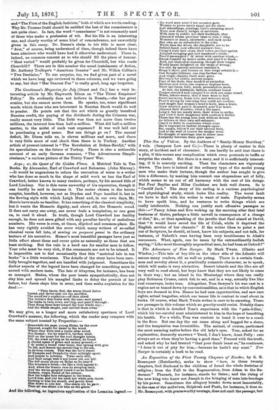Argo ; or, the Quest of the Golden Fleece. A
Metrical Tale in Ten Books. By Alexander, Earl of Crawford and Balcarres. (John Murray). —It would be ungracious to refuse the recreation of verse to a writer who has done so much in the shape of solid work as has the Earl of Crawford, better known to many readers, perhaps, by his second title of Lord Lindsay. Nor is this verse unworthy of his reputation, though it can hardly be said to increase it. The metro chosen is the heroic couplet, handled, however, not as Dryden and Pope handled it, but in the flowing style with which Leigh Hunt and, in our own days, Mr, Morris have made us familiar. It has something of the classical simplicity, bat it wants the Homeric dignity, and above all, the Homeric sound. It does not carry one away, one never feels a temptation, as one goes on, to read it aloud. In truth, though Lord Crawford has facility enough, he does not seem gifted with any peculiar faculty of melodious numbers. His verse is even, at times, slipshod and common-place. He has very rightly avoided the error which many writers of so-called classical verse fall into, of sewing on propurei panni to the ordinary texture of his narrative. Homer's most beautiful passages have just as little effort about thorn and occur quite as naturally as those that are least striking. But the rule is a hard one for smaller men to follow. Your robe must be very rich, if the ornaments are not to be missed. It is impossible not to feel occasionally that this "metrical tale in ten books " is a little wearisome. The details of the story have been care- fully brought together, and are handled with judgment. Sometimes the darker aspects of the legend have been changed for something more in accord with modem taste. The fate of Absyrtns, for instance, has been so managed. Medea, whom the poet treats sympathetically, dons not slay him and spread his mangled limbs to delay the pursuit of her father, but Jason slays him in error, and then seeks expiation for the deed:
"Then Jason, first, the warm blood thrice Tasted, and thrice spat out the sacrifice, The murd'rer's expiation—off then shred The victim's first-fruits with the axe—and spread The limbs in twin rows, sey'ring, and pass'd through : Then flung them heav'nward the four winds unto ; And the winds caught, and carried them away."
We may give, as a longer and more satisfactory specimen of Lord Crawford's manner, the following, which the reader may compare with the same subject treated by Propertius:— - Meanwhile his page, young Hylas, by the crew
Deputed, sought for water in the wood, Where they were told a rustic altar stood, Not distant; but he misted it, further went, Still on the quest for the cool draught intent. Till, the trees op'ning as he walked, he found A circled space of green and mossy ground,— I' SY midst a broad clear fount, that sprang with glee To life, and thence ran murm'ring to the sea, In devious course. This was the lov'd resort Of Nymphs and Dryads for their midnight sport, And prayer to Artemia. 'Twas early still, And their songs wak'd not forest yet, nor hill. The full moon shone on Hylas as he near'd The fountain's brink,—he like a God appear'd And, when the brazen vase he stooping sank,
And the waves gurgled round it as he drank,
Eudatia, virgin Naiad of the stream, Saw his bright face refulgent In the beam, Lov'd him, and o'er his neck her white arm threw, Seeking to kiss his month, and gently drew Him down to join her. One sharp cry he gave . Then all was silent o'er him as the grave."
And the following, an ingenious application of the Lemnian legend :— - No word men utter'd but occasion gave
Woman to prove man's equal, not his slave. Soft wheedlings, coatings, love's caressing mood. Were now disus'd, badges of servitude.
With men in public, not their husbands, they Diseased whose province 'twas to rule, t' obey, Woman's or man's, abstractly: and each spoke Her own an ox submissive to the yoke. While thus the wives, the daughters. not to be Behind-hand, now affected manners free; Cropp'd their hair close, their robes succinct uptied, Adopted swinging gait and manhood's stride ;
Pass'd passengers r th' street with careless brush,—
Swore roundly by men's oaths, and ceas'd to blush; Bold, not immodest-meaning, though their tongue Would haunt delighted on the verge of wrong; Yet still, by natural reticence restrain'd, Stopp'd short, and licence on that verge refrain'd,— One thought infirmer, one step further on, And virgin chastity Itself were gone. Refrence for elders, ancient usages, Fear of the Gods, they mock'd as prejudice.
Maidens and wives one common impress bore, Their ign'rance, folly, much, presumption more. At last, the husbands, fathers, constant found Tongue-match'd and conquer'd as each eve came round, When, labour-weary, they'd been wont to and Sweet harmony, home love, and welcome kind, Proy'd wrong by reae'ning they could not confute, And taught that woman's heav'n-born, man a brute, Grew wearied, pai❑'d, disgusted, sour'd at heart,
Abjured their firesides, lived a life apart,
Long'd. but too manly were, their wives to strike, And vlew'd their daughters with contirm'd dislike.
These last the young men took without debate As fellows at their own self-estimate; Csae'd to defer in courtesies where none Bas'd expectat'on feebler strength upon ; But, equals, follow'd out their natural bent, And to the wall of course the weaker went.
No thought of marriage rose in either case.
Antipathy between them grew apace.'






























 Previous page
Previous page